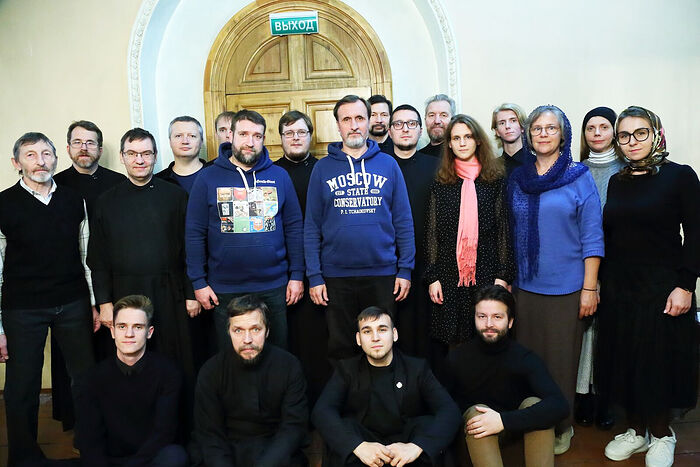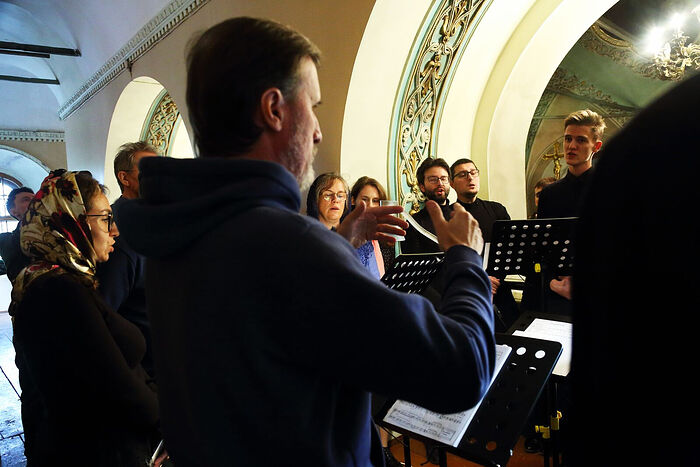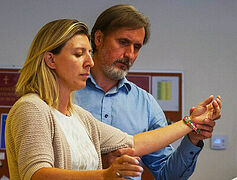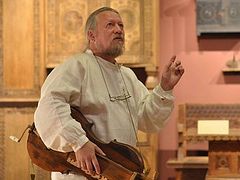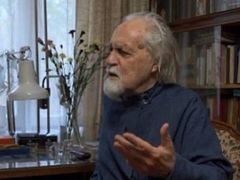Choir director Vladimir Gorbik shows how singers can express their prayers in one word, why a conductor should not spread his elbows wide apart, and where on the kliros to look for a balance between copying and one’s own interpretation
It was a crowded weekend at the parish dedicated to the Tikhvin Icon of the Mother of God in Moscow’s Alekseevsky District. The Church School’s main hall was filled with people involved in one of the most important specializations in the church ministry—choir directors, singers and young musicians studying this profession. A free and open master class was given by Regent Vladimir Gorbik, Associate Professor of the P.I. Tchaikovsky Moscow State Conservatory, and Choirmaster and Principal Director of his International Choir, presently based at the Tikhvin parish.
Several dozen listeners came from different Russian regions, as well as a number of choir directors from four countries near and far from Russia. All of these people made a special trip to Moscow for this class. Some students had already studied with Maestro Gorbik through various full-time and remote programs over many years. Several students in the masterclass participated as conductors.
Maestro Gorbik led the Male Choir and other choirs at the Trinity-St Sergius Lavra Representation Church in Moscow for a quarter of a century. More recently, he led the combined choir of the Trinity-St Sergius Lavra itself and the connected Moscow Theological Academy. Some of the students from these locales took part in this master class as well.
Vladimir Alexandrovich introduced the theme of the masterclass as “Practical Methods of Managing Church Choirs during the Performance of Common Chants.”
Maestro Gorbik interprets the last phrase—“performance of common chants”—somewhat more broadly than how most church singers and conductors might be led to understand it. For Vladimir Gorbik and the class, this phrase referred not only to the performance of liturgical texts in sticheratic, troparion and irmologic tones, but also to those composed settings well known to modern believers in the Lavra and Moscow parish traditions. In particular, during the lesson, the choir of singers sang the chants “Blessed is the Man” by Chmelev, “Gladsome Light” by Grebenshchikov, “Vouchsafe, O Lord” by Archimandrite Matthew (Mormyl), “The Prayer of St Simeon” by Ozerov, and the “Old Simonovskaya” setting of the Cherubic Hymn, as adapted by Pavel Chesnokov.
“About ten years ago, at one of the concerts in the Russian capital, as part of a large consolidated choir, I happened to sing the Psalm 133 under the direction of Vladimir Gorbik,” recalls Tatyana Velikanova, a female chorister of the parish of the former Spaso-Andronikov Monastery in Moscow. “That experience captured and inspired me so much that I entered the Saratov Diocesan School and received certification as a choir director there. I don’t direct the choir now, but I sing in the kliros, and I felt the need to renew and expand my knowledge. Moreover, over the past few years, for various reasons, the opportunities for personal communication and exchange of experience have significantly narrowed. I am very glad that this unfortunate trend is being reversed. I hope workshops like this will continue!”
In addition to the actual musical and technical techniques in managing a medium-sized ensemble of singers, Vladimir Gorbik shared with the audience his own achievements—both simple “life hacks” that teachers rarely pay attention to when training future choir directors, and important professional remarks about the essence of serving in the choir.
For example, the leader of the masterclass focused the audience’s attention on the fact that spreading the elbows to the sides too much when conducting is bad manners: “Don’t you already intuitively dislike a person who stands in public transport with his arms wide apart?!”
Vladimir Aleksandrovich pointed out that there are choir directors who are overly fond of keeping to a strict tempo with no expression, and showed them a different way: The conductor's right hand is ideally responsible for earthly, spatial impulses, and the left hand is responsible for the emotions of the heart and the expression of eternity at the particular moment of time being experienced. And only in the organic synthesis of their gestures, conveying the conductor's meter on the one hand and nuance with phrasing on the other, can the conductor’s ability to truly “read the open liturgical book” be born. this is the way in which the modern choir director should lead his or her church choir.
“Let's take one expression: ‘gave birth’,” Vladimir Gorbik addresses the audience, parsing the prayer “Rejoice, O Virgin Theotokos” as sung by the Ascension Convent in the Moscow Kremlin.
“The first two syllables are wide, solid, earthy. And, taking the third syllable “-la” on the subito piano, the choir, through just one word, conveys to the parishioners the feeling of the miracle of the birth of the Savior. In fact, we interpret a single word in this way as a whole prayer!”
Commenting on the well-known problem in art of correlating imitation and introducing one's own innovations, the masterclass leader remarks: “Of course, a good conductor must study the experience of the best conductors and navigate within it, being able to copy their techniques where necessary. However, the conductor has no right to present or perform merely a blind copy! Only a creatively reworked experience will make it possible to give out a sound musical quality, and in the end, this will make it possible to achieve from the singers such performance skills, those which are usually called prayerful singing in the Church.
After the master class, all its participants, forming a combined choir, sang at the services of the All-Night Vigil and the Divine Liturgy of the 14th Sunday after Pentecost. Vladimir Gorbik promised to continue and increase the frequency of master classes offered in Moscow (through which he has become known as an authoritative teacher of church singing all over the world). This instruction is to be made available not only online (which we all, alas, have become accustomed to in recent years), but in face-to-face classes, far more effective in the world of choral culture.
Watch the master class below:

